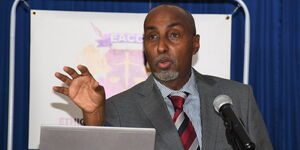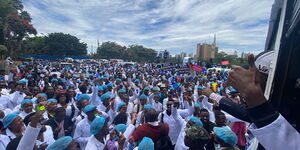The High Court on Thursday, May 13 ruled that the Constitutional Amendment Bill 2020 is unconstitutional due to a number of illegalities within the bill and the entire process that came up with the bill.
The ruling came after a five-bench judge of the Milimani Law Courts had been tasked with debating as to whether the BBI petition would proceed to the referendum. The judges were to determine 17 questions raised on the petitions against the BBI process.
The ruling was made by Justice Teresia Matheka, Joel Ngugi, George Odunga, Jairus Ngaah, and Chacha Mwita.
Conclusions:
1. The Constitution's basic structure doctrine is applicable in Kenya.
2. Basic structure protects certain fundamental aspects of the Constitution from amendment through the use of secondary constituted power or constituted power.
3. The essential features of the Constitution forming the basic structure can only be altered or modified by the people through their sovereign power and not merely through the referendum.
4. From a wholistic reading of the Constitution, its history and the context of the making of the Constitution, the basic structure of the Constitution consists of the foundation structure of theConstitution as provided in the preamble, the 18 chapters and six schedules of the Constitution.
5. The basic structure doctrine protects the foundation, structure and core value of the Constitution but leaves open certain positions as amendable through procedures outlined in Articles 255, 266 and 257 as long as they do not change the basic structure.
6. There are certain provisions in the Constitution insulated from any amendment at all because they are deemed to express categorical core values. These provisions are unamendable and cannot be changed through secondary constituted or constituted power.
7. The sovereign primary constituent power is only exercisable by the people after four sequential processes namely; civic education, public participation and collection of views, constituted assembly debate and referendum.
8. The power to amend the Constitution through referendum route under Article 257 is reserved for the private citizen (Wanjiku only), neither the President nor any state organ is permitted under our Constitution to initiate a constitutional amendment using the popular initiative route.
9. Under Article 143 (3) of the Constitution, the President can be sued in his or her personal capacity during his or her tenure in office, except for action or mission in respect of anything done or not done in the exercise of his or her powers under the Constitution.
10. The Constitution Amendment Bill 2020 which was developed by the BBI Steering Committee and is propagated by the BBI Secretariat is an initiative of the President. The President does not have a Constitutional mandate to initiate amendments through a popular initiative under Article 257.
11. To the extent that the BBI Steering Committee was employed by the President to initiate proposes to amend the Constitution contrary to Article 257, the BBI Steering Committee is an unconstitutional entity.
12. Additionally the BBI Steering Committee is unlawful because the President violated the provisions of Article 132 (4a).
13. In taking initiatives to amend the Constitution other than through the prescribed means in the Constitution, the President failed to respect uphold and safeguard the Constitution and to that extent, he has fallen short of the leadership and integrity threshold set in Article 73 of the Constitution and in particular Article 173 (1a) thereof.
14. The history of article 257 of the Constitution read together with Articles 95 (3) and 109 (1) and (2) of the Constitution yields the conclusion that in order to effectively carry out referendum process as contemplated under our Constitution, it is necessary that specific legislation be enacted to that purpose.
15. Notwithstanding the absence of enabling legislation as regards the conduct of the referendum, such constitution process may still be undertaken as long as the Constitutional expectations, values, principles and objects especially those in Article 10 of the Constitution are met.
16. Parliament, County Assemblies and any other state organs cannot under the guise of consideration and approval of a popular initiative to amend the Constitution under Article 257 of the Constitution alter or amend constitution amendment bill presented to them.
17. Article 255 (1) of the Constitution yields a conclusion that each of the proposed amendment clauses ought to be presented as a separate referendum question.
18. Article 89 (1) of the Constitution which provides for the exact number of constituencies while being part of the basic structure of the Constitution is not an eternity clause, can be amended by reducing or increasing the number of constituencies by duly following and perfecting amendment procedures in Article 255 to 257 of the Constitution.
19. The criteria and procedure for the limitation of constituencies set out in Article 89 (4), (5), (6), (7), (10) and (12) are unamendable constitutional provisions. They are eternity clauses and they can only be amended by the exercise of primary constituted power.
20. It is unconstitutional for a constitution amendment bill to directly allocate and apportion constituencies in contravention of Article 89 of the Constitution.
21. The IEBC cannot conduct any proposed referendum because
i. It has no quorum as it needs to have 5 commissioners
ii. IEBC has not carried out nationwide voter registration
ii. IEBC has no legal or regulatory framework for verification of signatures as required by Article 257 (4) of the Constitution.
22. All actions taken by IEBC in respect to the Constitution Amendment Bill 2020 are null and void.












